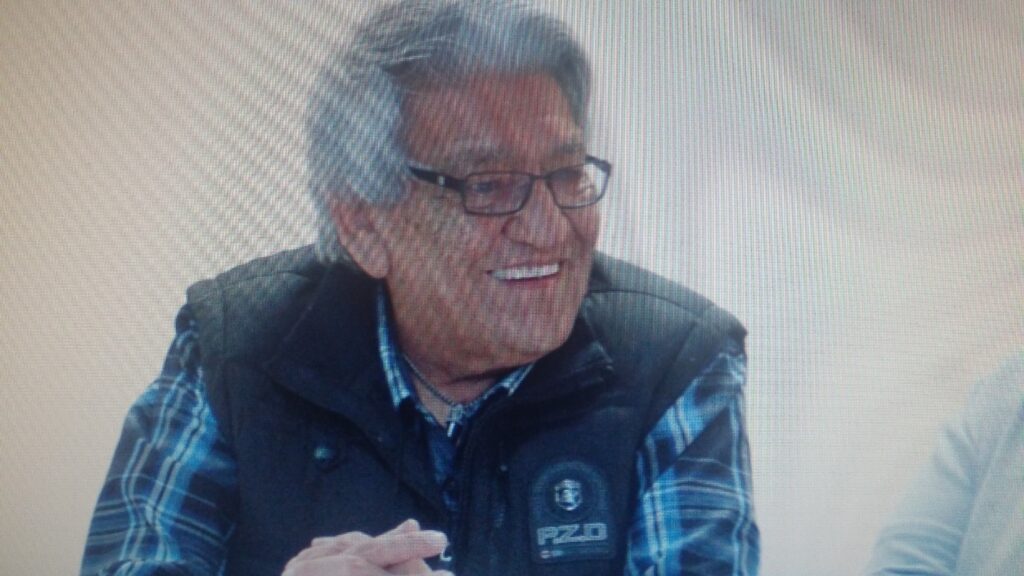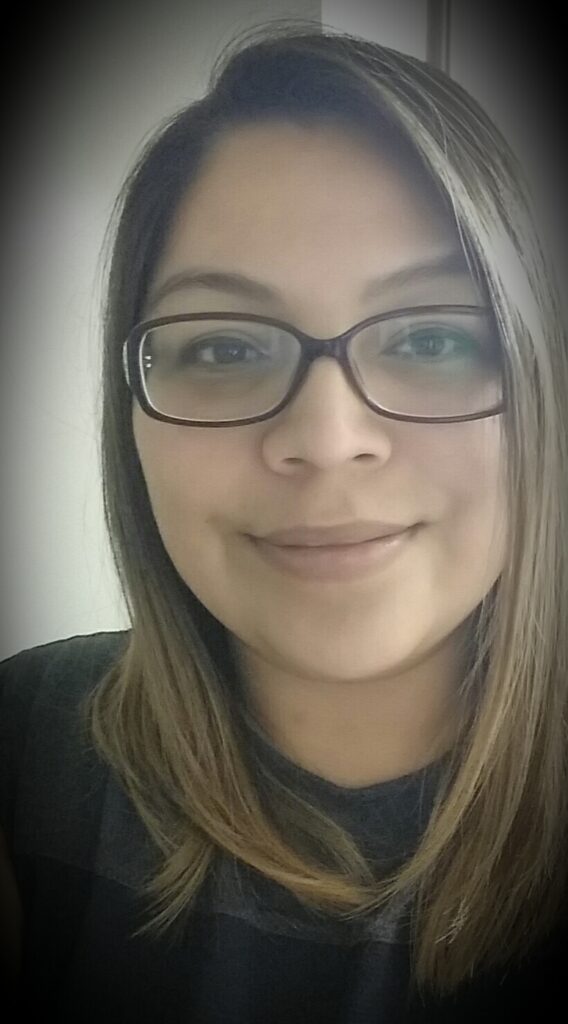Article 1: Interview with Elder Jack Robinson

Ever since I was a little girl, I have always been fond of the sky and all its wonders. Although sunny days are beautiful, I admire the night sky the most. I love gazing at the stars, the moon and even the lightning if occurring; but my favorite nights are the crispy-cool nights with Northern lights because the land and its inhabitants are lit up. In our language, Cree, these northern lights are called ‘Wāwātēwak,’ and are considered sacred by many Aboriginal tribes. My spirituality led me to view these as of harmonious connections to the world as guardian spirits. I wanted to understand more about the legends that people tell, so I have searched and explored. Now I am to put in written context of the legend told by an Indigenous Elder, and this way our people will always know the teachings behind it.
As I grew up in a small community of Pimicikamāk First Nation in Cross Lake, I recall hearing stories of the wāwāytēwak. When I lost my mosōm, grandfather, a few years ago, I clearly remember the night when I heard the story. The family was standing by his sacred fire. A family friend mentioned that the circle of life was based on traditional spirituality where great honour was given to the interconnectedness of life stages; birth, child, adult and senior. To comfort us, he told us that death was only physical while the spirit reunited with our loved ones who had passed before. The spirit then flies free so that it can dance with the other spirits — the northern lights. The idea that there is more after death and that death is only a part of the cycle helps the mourning family to cope with the loss of a loved one. And so, I think about this therapeutic idea lot because I have endured great losses of my youngest brother, Marcus, and my kokōm, grandmother. Marcus was only nineteen when he died in 2014, and a few days later my kokōm passed away. Today, the thought of them as ‘reunited’ and ‘dancing’ spirits with my mosōms, lessens the pain of my broken heart. Nowadays I look forward to the beautiful colors and movements of northern lights.
Since I gained perception of the northern lights, I also wanted to know why we ‘whistle’ to make the northern lights dance. Thankfully, I got an opportunity to seek a story-teller, Elder Jack Robinson, who knows the legend. I am very lucky to know him because he is always accessible to youth. Excitedly, I talked to him about my interview with him. My first thought was to gift him the thermal gloves and socks for his honorarium. I bought them so he could keep warm for the winter. Certainly, I offered him a tobacco and cedar pouch, and treated him to tea from Tim Hortons. For his wellbeing, I had agreed for the interview to take place in the comfort of his own space and time. Ethical and practical considerations means that I behave that I do this to show respect to my Elder and to have his best interests in mind. I explained to him, before I interviewed him, of what I was going to do with his information. That information is for use in an educational setting and I will provide him with a copy. It is proper to let him know how I will use his story, so he can decide whether he wants to continue with a signed consent to release for educational use. And so, I continued as he wished and respected the giving of his knowledge. I also planned to translate the story if he would tell in the Cree language. The Cree I transcribe might be different to others. Here is our interview.
Interviewer: tānsi [Hello!] My name is Arvella Blacksmith. tānsi isinĭkāsowan? [What is your name?]
Interviewee: ayow nitisinĭkāson [My name is] Jack Robinson, ayĭk ohci [from] Norway House, Manitoba, it’s where I was born and raised. My spirit name is heatwave man [Ŏpāpatēwih-nāpēw]. I got that name from my grandmother Charlotte in Cross Lake when I was born.
[…]
Interviewer: hmm…mmm, how did you come to know your stories, your legends?
Interviewee: I guess I learned them when I was just a little boy from my grandparents and from my parents. Because when I was just a little boy and growing up, there was no television. People told stories, old legends or how things came to be. And we always looked forward to that. So, there was an elder coming one night, he was going to come to tell us stories, but then everybody had their own stories too. My grandmother tells stories, my grandfather tells stories, my mother would tell me stories that she heard from long time ago. (Slight pause) That’s the way it was and there was a moral to every story,
Interviewer: hmm,mmm…(nodding).
Interviewee: Oh, you know, with the teachings about respect, about love, humility, all those; the seven teachings, every story had some of that moral to it.
Interviewer: eh heh [yup]
[…]
Interviewee: [nods to express]. ēh mācika ayŏhŏ, [like] wāwātēwak kā-yitakik, [the northern lights they call] ēh wāwētēkē [they are bright].
Interviewer: ēh ēh. [yā].
Interviewee: There are different stories, pēyak anima [one of them is].
There was a little boy, [ē-kĭ-wanĭyāt ŏmisa] lost his sister. She passed away and the little boy really missed his sister. And he couldn’t understand so they tried to explain to him why she had gone, she’s gone to the spirit world. And he would every night, he would try to leave to go look for his sister. So as he got a little older, he was still the same. So one day, he said, “I am going to go look for my sister.” And then he started walking and he walked for days and every night ēwko anihi [those] he seen, as he came to a hill and he saw lights and all of sudden he heard a drum. Someone was singing and the song that they say he heard was (singing) wā-wā-tē…wā-wā-tē…wā-wā-tē…wā-wā-tē… [Northern lights]. He followed that sound, he followed that drum. All of sudden he came up to the hill and then he saw all these lights and they were (waving arms) were dancing. Then all of sudden, he saw an elder sitting on a log and he had a drum and that elder was singing; wā-wā-tē…wā-wā-tē… [Northern lights]. He went up to the elder and said, “kēkwān ōma kā-ĭsinākwāk?” [What is this?] Meaning the northern light, āho itwēw [ok, said] the elder, kakĭ- wanĭyahkok [the people we have lost], kakĭ- nakatikwēhēkok ōē ispimĭk ǎyitōtēcik [Those that gone up meaning to the spirit world]. kā-wāpimacik ŏko (waving up) [you see these], kikĭ- wāpimikŏk ē-pēci-nŏkosĭyan [they saw you coming]. kimis ŏta wĭsta ayāw [your sister is here too]. Ē-kwēniw ŏhci ē-māci nĭmicik [that’s why they’re dancing]. (Waving arms) kanawapāta kwǎyēsk [have a good look]. kwēskŏsĭyāni kika-pētakok ta-pēnasĭwak [and if you whistle they will come down].. So, nĭna nĭkān ni-nakamon pihtamā itēw. [I will sing first] akwāni kā-nakamot, ēkwēniw kā-pacĭtāt [and then he sang this song] ‘wā-wā-tē…wā-wā-tē’. akwāni [and then] that little boy māci kwēskosĭt [He started whistling]. āsāyi kĭ- nĭci- paniwak [northern lights coming down lower]. ēkota kapē- wāpimāt [right there he seen] his sister ē-nĭminit [Dancing]. She was dancing with all these other people, all these other spirits and she looked very happy. And he looked up at her and said, “I’ve been looking for you for a long time.” Ē-kanawāpimāt [he looks at her] “ēhh tāpwē āsāy kayās kā-ohci pāmintonātān” [I have been looking for you for a long time]. “āw” itwē [ok she said] sister spoke to him “āw, kimiskawin akwa” [ok, you found me] “ki-kiskēnĭtēn itē kā-yayān’ [you know where I am now]. kisāsin ki-kaskēnĭtēn [if you’re feeling lonely], kisāsin mistayi kitēnĭtēn apō [or if you are having a very hard time], kwēskosĭ, napē-nĭsātayin [whistle and I will come down].”
Interviewee: So that’s one version of the northern lights. (Smiles)
Interviewer: (happy) ēwko anima [that’s exactly it], I am so glad that you that story and why we whistle, as that is one question I searched for. ēkosi [Okay, Good], I have found my goal and I love the story that you just told. It really touches my heart isa nĭsta [me too]. And I think that pretty much covers it, and I thank you.
In regards of oral traditions, there are many Aboriginal people like Jack who want to save the knowledge that is part of their culture. Due to the crisis of losing our language and traditional knowledge, people are starting to transcribe our stories; otherwise many of them will be lost forever. Although, stories are meant to be told orally, there is a lot to learn and must also be done in a written context in order to pass on to our future generations. This will provide an outline of how it can be done with the knowledge of a wise man and a curious student, using video/audio recording equipment. It is necessary to continue to use traditional knowledge so that it will continue to be part of our lives, our ways of life.

About the author: Arvella Blacksmith is an Indigenous woman from Cross Lake, Manitoba, also known as Pimicikamak Cree Nation. She is currently in the 3-yr Bachelor of Arts at the University College of the North, Thompson campus. She plans to pursue in the After-Degree Bachelor of Education in the 2018-2019 academic year. She is studying Aboriginal & Northern Studies as her major and is very fond of what the study has to offer. The studies has given her value to enhance her cultural knowledge and ethical practices, not only for educational purposes, but also for personal reasons: healing and wellness. These aspects are very important to her as she wants to be an educator and working with Elders back home. She is a dedicated person in her studies and a loving mother in her family, whose two beautiful daughters are her inspiration. Instructor’s Remark: Arvella Blacksmith speaks Cree. Her “Interview with Jack Robinson” retells his story about the northern lights, and also provides the reader with inspiration for and reflection on the interview (Dr. Ying Kong).

